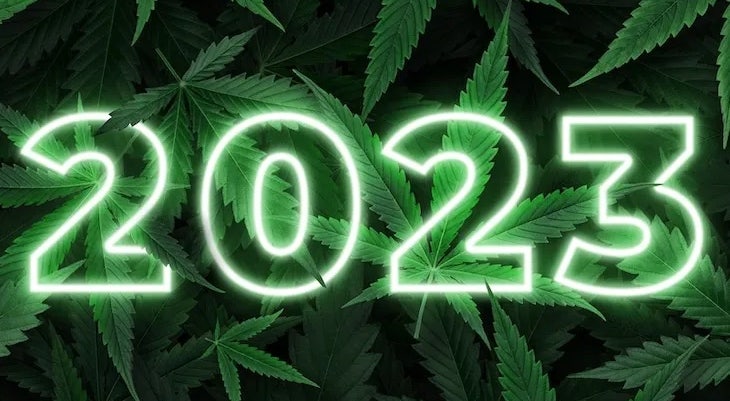
This article was originally published by the National Organization for the Reform of Marijuana Laws (NORML) and appears here with permission.
#1: A Surfing Wave of New Adult-Use Marijuana Legalization Laws Across the U.S.
In 2023, adult-use marijuana legalization laws gained traction in several states such as Delaware, Minnesota, Ohio, and Maryland. This crucial shift in stance laid the groundwork for regulating the retail cannabis market. Maryland lawmakers passed legislation in May, paving the way for adult-use marijuana sales to commence on July 1st. Additionally, the US Virgin Islands approved an adult-use legalization law in January, albeit with pending provisions.
Paul Armentano, NORML’s Deputy Director, emphasized, “For the first time since the adoption of federal marijuana prohibition, more US citizens reside in jurisdictions where cannabis is state-legal than live somewhere where it is not.”
#2: HHS Urges DEA to Reclassify Marijuana as a Schedule III Substance
In August, Bloomberg News revealed a leaked letter from the Department of Health and Human Services (HHS), recommending the reclassification of cannabis from a Schedule I to a Schedule III controlled substance under federal law. The Biden Administration initiated the review last year. Despite this, the DEA, which has the final authority regarding drug scheduling under the Controlled Substances Act, has yet to publicly take any action on the matter.
NORML has expressed discontent with proposals advocating for cannabis to be rescheduled from Schedule I to Schedule III, stressing, “Rescheduling marijuana fails to provide states with the explicit legal authority to regulate it within their borders as they see fit, free from federal interference.” Instead, NORML advocates for removing cannabis from the CSA entirely, similar to alcohol.
#3: Record Support for Adult-Use Legalization
A historic 70 percent of US adults voiced their belief that “the use of marijuana should be legal,” according to nationwide polling data released by Gallup in November. This marked a substantial increase from 2014, signaling the highest level of support ever reported by Gallup pollsters.
Morgan Fox, NORML’s Political Director, addressed this upward trend, stating, “As more states have adopted legalization, public support for this policy has risen dramatically. That’s because these policies are largely working as intended and because voters prefer legalization and regulation over the failed policy of marijuana prohibition.”
Furthermore, Gallup’s 2023 polling indicated that most US adults believe marijuana use poses fewer risks to health than alcohol or cigarettes. Half of all Americans ages 18 and older admitted to having tried cannabis.
#4: Expansion of Workplace Protections for Cannabis Consumers
Michigan and Washington implemented regulations in 2023 that restrict public employers from conducting pre-employment marijuana testing for non-safety-sensitive positions. Similar measures have been adopted by several other states and municipalities, including California, Connecticut, the District of Columbia, Minnesota, Montana, New Jersey, New York, and Oregon. This expansion underscores a growing recognition of cannabis consumption rights within the employment sphere.
Positive Trends in Marijuana Legalization and Business
Broader Workplace Marijuana Protection Laws Enacted in Rhode Island
Rhode Island has enacted broader workplace protection laws, limiting employers’ ability to conduct on-the-job testing for marijuana metabolites or to sanction employees for their consumption of cannabis while off the job. This decision reflects the changing cultural and legal landscape surrounding cannabis. It’s time for workplace policies to adapt to this new reality.
Federal Courts Reject Second Amendment Ban for Marijuana Consumers
In August, the 5th U.S. Circuit Court of Appeals ruled that a 1968 federal law prohibiting the possession or sale of a firearm to an “unlawful user” of a controlled substance should not be applied so broadly that it would criminalize all gun owners with a history of marijuana use. This decision came after a federal judge for the US District Court for the Western District of Oklahoma ruled that the “mere status as a user of marijuana” does not justify the federal government “stripping [the defendant] of his fundamental right to possess a firearm.” NORML Legal Committee members filed a brief, calling on the court to find the ban unconstitutional.
Marijuana Arrests Fall to 30-Year Low
State and local police made at least 227,108 arrests for marijuana violations last year, according to data compiled by the FBI’s Crime Data Explorer. This marked the lowest annual marijuana-related arrests since the early 1990s, with arrests peaking in 2007 when police made over 870,000 marijuana-related arrests. At that time, just under half (48 percent) of all drug-related arrests in the US were for marijuana-related violations.
POTUS Issues Pardon Proclamation for Those with Marijuana-Related Convictions
In December, President Joe Biden issued a directive expanding the pool of marijuana offenders eligible for federal pardons. The President stated, “Criminal records for marijuana use and possession have imposed needless barriers to employment, housing, and educational opportunities. It’s time that we right these wrongs.” Estimates suggested that nearly 7,000 Americans with low-level federal marijuana-related convictions would be eligible for relief under the directive.
Teen Marijuana Use Remains Below Pre-Pandemic Levels
Federally funded surveys by the University of Michigan and the Substance Abuse Mental Health Services Administration report that rates of teens’ marijuana use are below pre-pandemic levels and near historic lows. These findings reassure lawmakers and the public that cannabis access for adults can be legally regulated in a manner that is safe, effective, and that does not significantly impact young people’s consumption habits.
FDA Fails to Establish Rules for Hemp-Derived Cannabis Products
Representatives of the US Food and Drug Administration announced in February that they were abandoning efforts to craft regulations governing the production and sale of hemp-derived products containing high levels of CBD and other cannabinoids. Instead, the agency should revise its approach to meet the growing demands of the cannabis industry.
Impactful Milestones in the Cannabis Industry
The Food and Drug Administration (FDA) has recently arrived at a notable decision on the regulation of hemp-derived cannabinoid products, which has sparked a nationwide conversation. After an extensive five-year evaluation, the FDA declared that its current regulatory framework for foods and dietary supplements does not adequately cover hemp-derived products, prompting them to call upon Congress to address the issue.
Heightened Calls for Regulatory Guidelines
In reaction to this decision, prominent advocacy groups such as the National Organization for the Reform of Marijuana Laws (NORML) have intensified their urging of the FDA to establish comprehensive regulatory guidelines encompassing the production, testing, labeling, and marketing of hemp-derived cannabinoid products. Such a move is being championed due to various analyses highlighting inconsistencies in product quality and potency, as well as the presence of contaminants, adulterants, and elevated levels of heavy metals.
Landmark Legislation in Kentucky
Meanwhile, in a separate watershed moment, the state of Kentucky has etched its name in the annals of cannabis history by becoming the 38th state in the United States to approve medical cannabis access. The move came to fruition as Democratic Governor Andy Beshear signed legislation mandating the implementation of a comprehensive medical cannabis access program by the state’s Cabinet for Health and Family Services, set to be in effect starting January 1, 2025. Matthew Bratcher, the Executive Director of Kentucky NORML, remarked, “For years, Kentuckians have been calling for medical cannabis legalization and now they will have the freedom to safely access regulated, therapeutic products right here at home. While there is still work to be done, this is a historic first step and we look forward to continuing our work representing Kentucky patients.”
NORML was founded in 1970, making it the oldest continuously functioning cannabis advocacy group in the U.S. and therefore the world.
Image courtesy of NORML


